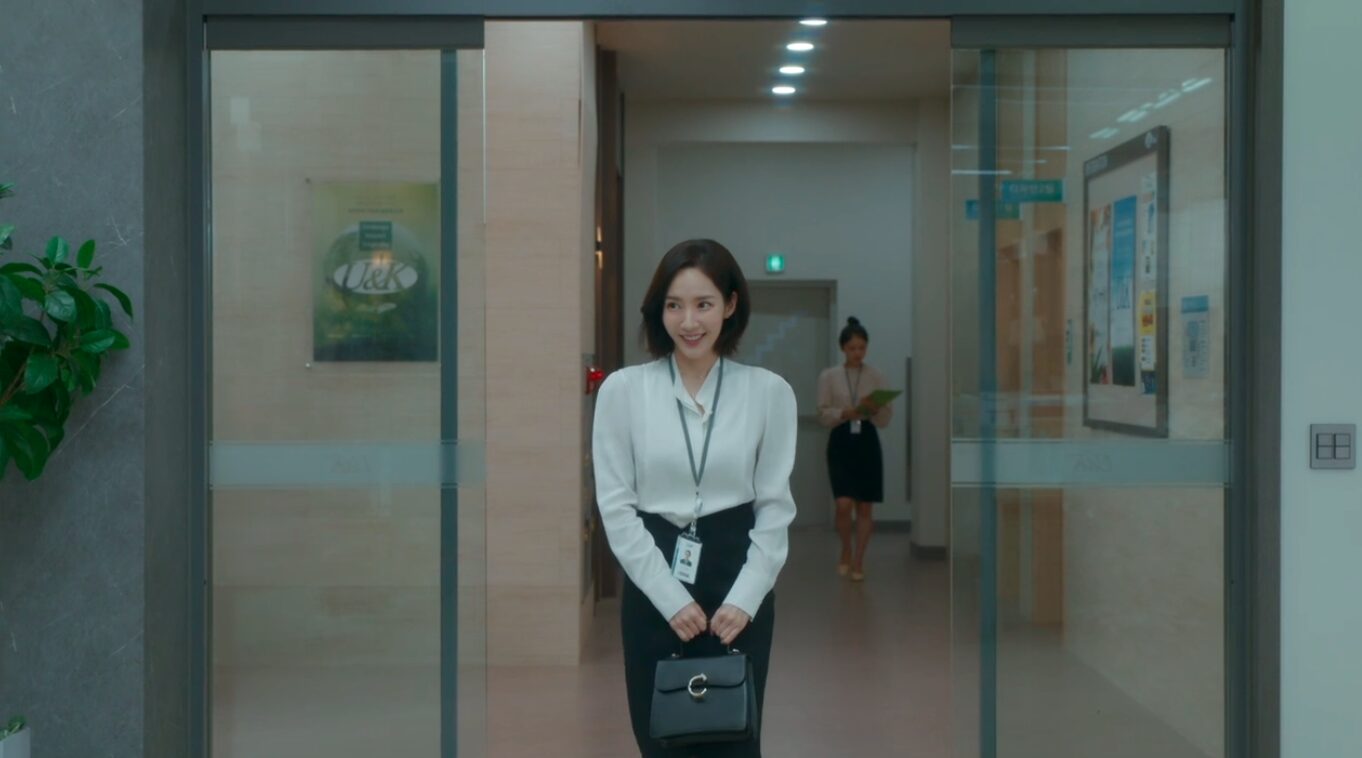SF8 gives us a travelogue to nowhere in Joan’s Galaxy
At the end of SF8‘s third story, Joan’s Galaxy, the eponymous Joan gives a presentation about the novel A Sentimental Journey Through France and Italy.
“A travelogue without a destination”, she calls it, “a plotless novel”. However, she concludes, “this is how life is”. We go with the flow without direction but we still encounter brilliant fleeting moments.
It’s obvious that the writer of Joan’s Galaxy was heavily inspired by the novel; written as it was by a man near death. On paper the episode is a simple and quite beautiful story about living life as if you may die tomorrow. But in execution Joan’s Galaxy falls short.
The Plot
It’s 2046 and pollution has gotten so bad that it has a material impact on our life expectancy. A vaccine has been developed that enables people to have a normal lifespan by producing antibodies that can fight the destructive impact of the fine dust. Those who have been vaccinated are ‘C’ for Clean and have a life expectancy of 100 years. Those who haven’t are ‘N’ for Not Clean.
With a life expectancy that averages thirty years, Ns face a great deal of discrimination, especially around education and employment. They have also moved into ghettos like ‘N Town’ where they can live out their short lives with other N’s.

When young University student Yi-oh (Choi Sung-eun) is diagnosed with a tumour, she discovers that her antibody injection accidentally went to somebody else. Having spent her whole life as a C, the revelation she’s an N sends a shockwave through her life and that of her family. She begins spending time with fellow N student Shin Jo-an (Kim Bo-ra) as she explores a life that could end far sooner than she expected.
A Brilliant Fleeting Moment
There are two ways to look at Joan’s Galaxy as a piece of work. One is to see it as the arthouse film it is, with its small moments of connection and conversation. A character piece. A slow-paced journey to nowhere. By being forced to suddenly confront her own mortality, Yi-oh is forced for the first time to live rather than to simply plan for a long future.
Kept safe behind protective suits and avoiding anything that could affect her health, she has never had a single moment that was truly beautiful and memorable. Is it better for life to be long and safe or brilliant and fleeting?

In media where representation of race, sexuality and even multiple kinds of femininity is still lacking, Joan’s Galaxy is a welcome depiction of a relationship that is, if not outright lesbianism, at the least homoerotic.
But SF8 is not a series of arthouse films, it is an anthology of science fiction. And as a science fiction story, Joan’s Galaxy simply doesn’t survive scrutiny. Yi-oh and Joan live in a clear dystopia and yet the elements of that dystopia are handwaved, even by the characters themselves.
Fine dust is already a problem in Korea, as it is in neighbouring countries such as China. But fine dust is not a problem that just happens. Not like a virus or a natural disaster. For fine dust to get as bad as it is in Joan’s Galaxy means that humanity chose to let it get that bad and yet the fact of it remains unremarked throughout the episode. More importantly, there are clear issues of gross structural inequality and failures in healthcare here that goes unremarked as well.

When I first started Joan’s Galaxy I spent a good chunk of the first half thinking that the Ns were people whose body had rejected the antibodies or who couldn’t be vaccinated – like people who can’t get a flu vaccine because they’re allergic to eggs or have a compromised immune system.
I was horrified to discover that this was a simple issue of wealth. Only people who can afford the vaccine get the vaccine. Now I’m not saying that there aren’t privatised health systems in the world that already decide who lives and who dies by their allocation of resources. But I was disappointed that this wasn’t the point of the show on any level.
The dystopia in Joan’s Galaxy in fact resembles modern day Korea to a point that should have given the production team pause but for some reason didn’t. A privatised health system. A wealthy elite. An increasing pollution problem. Expanding social inequality. But like many traditional Korean dramas, Joan’s Galaxy tells a tale of surviving within a system rather than changing it and while this is fine for your standard weekender, for a science fiction story it’s a questionable choice.

Sing Along With the Common People
Once you realise that Joan’s Galaxy is simply a story about socioeconomic divide, the issues with the story start to coalesce.
At one point, Yi-oh and her N friend travel to N Town out of curiosity and end up getting a tour from a local who emphasises the slum’s colour and life. Yi-oh stands in amazement at the vivacious beings who dance in the streets without masks. N’s, we are told, are artists and athletes who devote the energy of their short lives to living.
The visuals of a young wealthy woman stepping outside her hermetically-sealed life of privilege to see how the other half lived reminded me of the time I joined a busload of other comparatively wealthy tourists to look around the bright bohemian neighbourhood of La Boca in Buenos Aires.

La Boca is a vibrant working-class neighbourhood of art and tango; a place where the people were so poor they needed to scrounge paint from the local shipyards and could never get enough of the right colour. Their houses are a brilliant, striking clash of light and colour but that’s only because of the poverty. La Boca and N Town may both be associated with vibrancy and artistry but that’s because they’re just so damn poor.
You will never understand
Pulp, Common People
How it feels to live your life
With no meaning or control
And with nowhere left to go
You are amazed that they exist
And they burn so bright
Whilst you can only wonder why
Yi-oh’s fleeting moment of brilliance essentially comes from being a tourist in another world; one that the people who live there didn’t choose. She may technically be an N but she continues to live a C life with access to a state-of-the-art purification suit and the very best medical care that money can buy.
So it turns out that Joan’s Galaxy really is a travelogue: one that tells a story of a wealthy and privileged woman who went on a journey to see how the other half lived and then went home, gouging out those experiences for herself without ever reflecting on her role in the wider social inequality she benefits from.
Yi-oh is holidaying in someone else’s poverty and gets to go home at the end. And while there’s nothing wrong with this in principle, it should at least lead to self-awareness. But for Yi-oh the N’s situation is simply a matter of the natural order. And like Western tourists swanning around less-developed countries talking about how real everything is compared to home, she’s missing the entire point.
If anything, the episode’s conclusion that the Ns were quite happy with their short brutal life because it motivated them to succeed in their artistic endeavours seemed to be a justification for the status quo that comes across as tone deaf. An implication that it was perfectly fine for entrenched inequality to exist; so much so that nobody – even our main character – cared they were effectively sentencing a huge swathe of the population to an early grave.
So while it might be nice that Joan and Yioh found a small moment of perfect happiness within their dystopia, I can’t say that Joan’s Galaxy worked for me as a story. I guess I need my travelogues to have a destination.





Great post LT!
I have reservations about Jo-an’s Galaxy too. I snorted at N-town and its outdoor festival, and wondered why the art produced by the N’s was so bland. Surely there should be a Jarvis Cocker, if not a Rage Against The Machine, among them?
What I do find arrestingly peculiar about the world of the show is that the privilege the Haves have and the Have-nots don’t is such a stark one – the privilege of living – yet the mood is so muted. The hazy images and the wan characters seem to suggest a sort of global listlessness, even among the arty N’s. I don’t think artistic success is being used to justify the status quo, and I’m pretty sure viewers are meant to look askance at the N-town tours, the socioeconomic disparities (e.g. Yi-oh’s doctor friend being unable to afford a decent air-filtering suit) and the attitudes of someone like Yi-oh’s mother. It doesn’t seem accidental that the other tourist at N-town is an acknowledged N, and almost the first thing that they encounter in N-town is the spectre of serious illness and imminent death. That all these things are depicted so quietly therefore seems like an artistic/narrative choice rather than a failure of understanding.
My take on Jo-an’s Galaxy is that it portrays a world where all the struggles have already taken place, and everyone believes it’s impossible to change anything, and is resigned to their fate. Viewed from that perspective, perhaps it could be regarded as a call to young people to overcome the pall of impotence and apathy that has fallen over so many of us, and to find love and purpose like Jo-an manages to do. The problematic context does undermine the message, though: e.g. it seems awfully limited and middle-class, cos even Jo-an and the doctor friend have access to resources that many young people in the real world can only dream of. As an admirer of the C vs non-C idea, I’d love to see it being used in a more coherent, daring way.